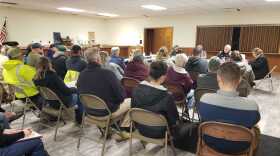The Oneida County Board wants the Wisconsin DNR to do more testing of private wells in the county.
PFAS chemicals have been linked to health conditions like increased cholesterol levels, decreased vaccine response in children, and increased risk of kidney cancer.
The Town of Stella in Oneida County has some of the highest concentrations of PFAS in private wells in the country.
Levels thousands of times higher than what’s considered safe for drinking have been found in the wells of dozens of homes.
It’s also been found in nearby lakes and rivers.
While no cause has been officially found by the DNR, the department is looking into the possibility of sludge spreading on nearby agricultural fields as the source of the PFAS contamination.
Some members of the Oneida County Board believe there could be more scenarios like this in the county.
The advisory resolution calls for the DNR to offer to pay for private well testing of homes near sites where biosolids have been spread in the county.
Supervisors made a couple amendments to the resolution before passing it. One was to increase the area tested from a 2-mile radius to a 6-mile radius.
Tom LaDue had asked for supervisors to increase it during public comment. He lives on Snowden Lake in Stella where dangerously high concentrations have been found.
So far, the DNR has paid for well testing within a 2.5-mile radius from Stella Town Hall.
“We're not to eat the fish out of the lake. We should be careful swimming, not to swallow any water and take a shower after swimming. I have six grandchildren that come up to visit me in the summer. I have yet to know what I'm going to do about that,” said LaDue. “I have neighbors that live outside that 2.5-mile radius. Their wells have tested high for PFAS chemicals. 2.5 miles may not be far enough.”
Other amendments wanted to make it clear to the DNR that Oneida County wants to know the location and history of sludge spreading in the area and have that information readily available for residents.
“No resident should have to go to a state agency to find out what's impacting their health in their county. Your Department of Health should be able to provide that information to you,” said Supervisor Steven Schreier.
The amended resolution passed 17 to zero, with four absent.
WXPR reached out to the Wisconsin DNR for a list of sites where the DNR has permitted biosolids to be spread in Oneida County.
We’ll bring you an update when we get that information.










